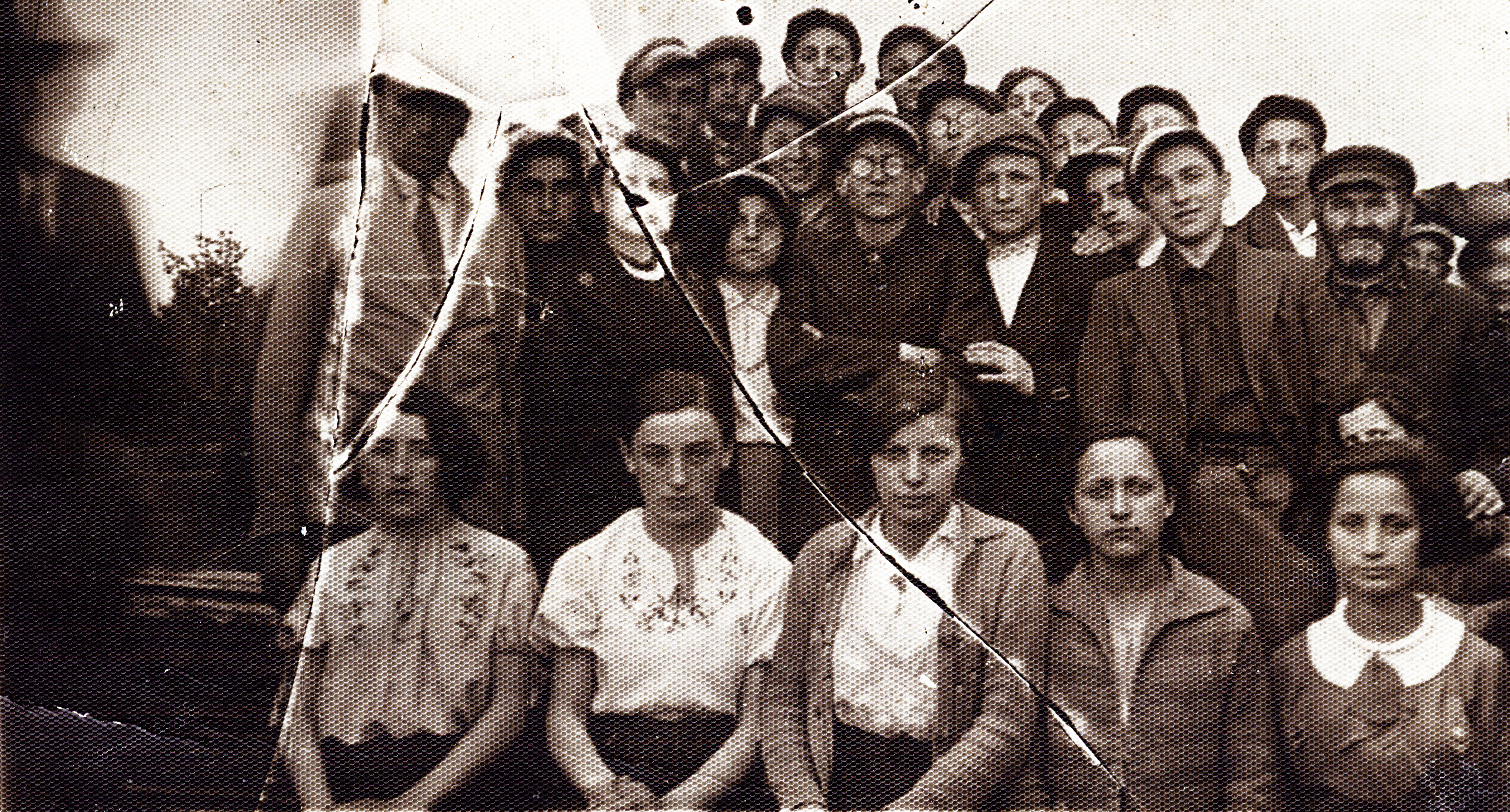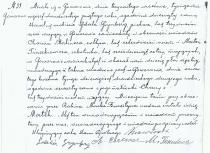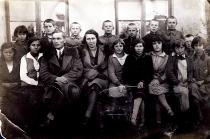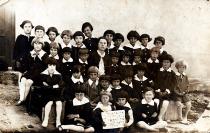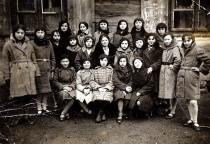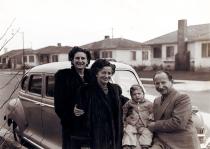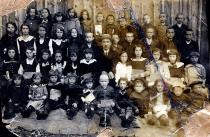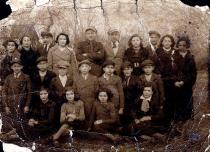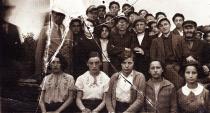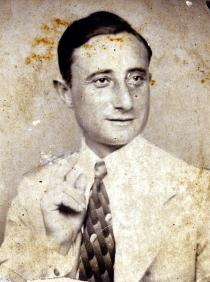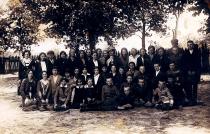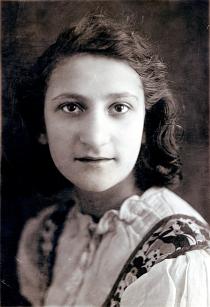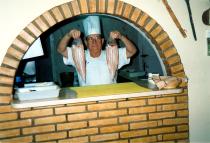This is the ha-Shomer ha-Tzair group from Goworowo. There are only Jews here, of course. The third from the right in the second row is Yair Karwat. His father was a melamed. The second from the right in the second row is Szmul Szmelc. His parents owned a Jewish butchery shop. The second girl from the left in the first row is Dwosze Gemura. She was my sister’s friend. As many of these young people she left for Canada. Her entire family now lives in Montreal. Finally, the third person from the right in the second row - that’s me, Icchok Grynberg. I don’t know who took this photo.
Among young Jews it was rare for someone to get an education. There was only one thought that occupied Jews: to emigrate. To leave and be able to make money. Whoever had arms and legs and could emigrate - left. First a man went, leaving wife and children. Later, when he was able to, he invited his entire family to come over. And from our town, Goworowo, many people emigrated. They usually went to America, Brazil, Uruguay, Mexico or Cuba.
Our town was very rooted in Jewish traditions. Everybody belonged to some organization. There were organizations: Poalei Zion, an orthodox religious organization Agudat Israel and Bund - a modern Jewish organization saying 'We were born in Poland and have to make a life fFor ourselves in Poland'. Youth organizations were also very active: there was Beitar, there was Hahalutz, which prepared kibbutzim in Poland. They exercised, went to farmers to learn farming, and they all got together and went to Israel (if they got a certificate, permit from the English). First wave of youth left in 1929 - 1930. My cousin Ester, Necha Szachter, Natan 'Nuske' Szron, Lejbcze Gewura, Idel Rudka were among them… I remember till today when they went to Israel. The arrived in Palestine long before the war. And I remember, if some of them were earning money, they used to send some home
Among Jews, when a boy was 14, he had to have a profession. My father said to me then: 'Zinele - my son - it's time for you to get a profession'. First Father sent me to a tailor. It was in Goworowo, although the tailor was from Radzilow and everyone used to call that tailor 'der Radzillowiczer' or 'Radzillower'. I was very energetic, so I worked with enthusiasm: I sewed, darned… But it wasn't for me. I felt too strong, too muscular for a job like that. I was looking for a more physical kind of work. So Father decided I should learn to be a tinsmith and sent me to Warsaw. I was 15 or 16 at the time [1937]. Father had a friend who lived on Solna Street, near Twarda Street. His name was Sucher. He was a tinsmith - repaired pots, finished beds, filled holes, fixed windows. And Father decided with that friend that I would be there as a 'learningl' [apprentice]. His store wasn't big, maybe 12 square meters. It was a shop at the same time. Everything was made by hand there, everything! At the back there was one room and a kitchen. Sucher lived there with his wife and two daughters. For me - out of some wooden boards that they hung over the shop - they made a mezzanine, a kind of attic separated with a curtain. I slept there. Sucher gave me food and something to drink. I worked as much as I could. From the very morning till evening. I didn't know the words 'work hours.' I didn't like this job too much. On top of that, I wasn't a good boy. I kept on scaring those girls, Sucher's daughters. I didn't want to stay there.
One Pole, his name was Sobotka, used to come to the shop. He had a truck that he used to bring goods to Warsaw. At some point - after 2,3 months of working for Sucher - when I found out that Sobotka was going to Goworowo, I said nothing, but got on the truck, sat at the back with the goods, and went back home. I arrived at Goworowo at 6am. I went to the bakery where Father was working with an apprentice, and said: 'I'm here.' Father was surprised 'How come, you're here?' I surprised Dad. But because a young man has to do something, Father said to me: 'I see no other solution - you will be a baker!' I wanted to be a baker, because I was strong and wanted to do physical work... I was 16 or 17 and worked as a baker for two years. Father sent the apprentice away and I took his place. I remember as if it was today, there were no machines to knead the dough. It had to be done with hands, in flour. And I did all that. We worked nights only. So, as a child, I worked till 4am. I made whole wheat bread, the original one, then rye bread, and in the end buns, and kaisers… And, I remember, if we were getting together for games and dances in the evening, I often slept in and the buns got burnt or overgrown! But I worked well.
When I was 17 I wanted to start earning money. I was an apprentice, which means I was a qualified baker. We usually worked since Pesach, which is Easter, till Rosh Hashanah. For that half a year I was hired as an apprentice. During that time, the apprentice who used to work for us, found himself a job in Nasielsk, near Nowy Dwor. So I asked him to help me get a job there. He found me a job at one baker's whose name was Rajczyk. So I left for Nasielsk on Easter 1939. Rajczyk had his own store. The bakery was in the basement, and he lived on the first floor with his wife. They only took care of the sales. I did the work - I took care of everything myself. They gave me board and clothing. I didn't work on Sabbath.
The worst moment for me was Saturday night when I had to go back to work at night. As a young man I wanted to go have some fun somewhere with the other young people, girls and boys. But instead of getting some sleep and rest - I had to go to work. That was the hardest night of the week, but I managed. I was making big money then, that is 18 zloty a week. That was a big amount. I was sending all the money to Father, thinking that when I go back, he'd return it to me. Besides, my sisters had to be married off [and that cost money as well].
.
